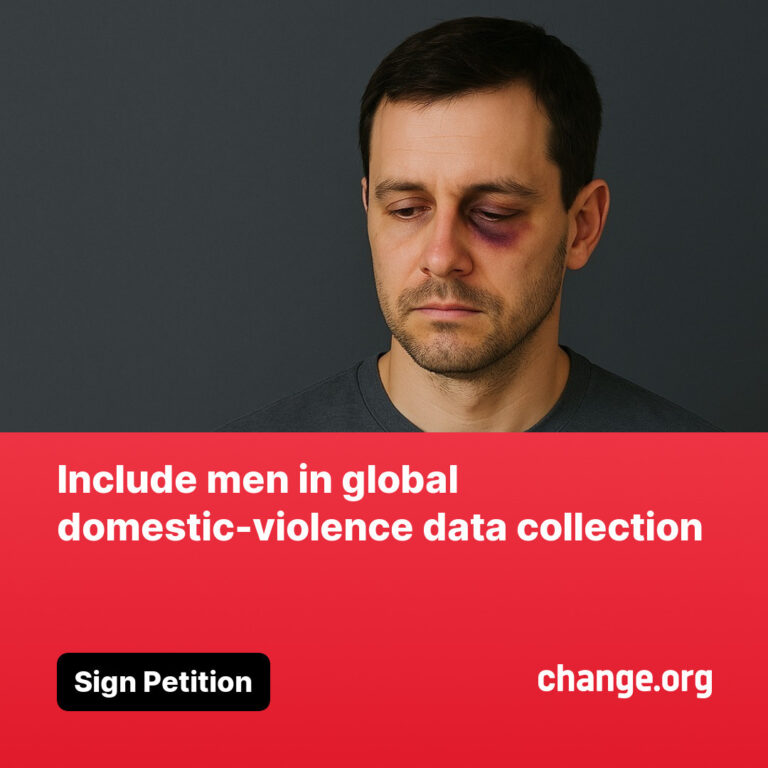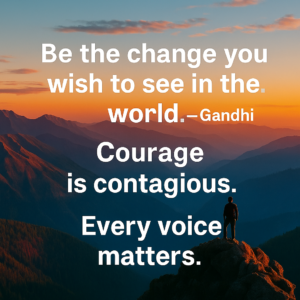Why This Matters
I never planned to become an advocate.
It happened after years of listening to men share their struggles. Almost half of the men I have worked with have quietly shared stories of domestic abuse. The same stories exist within my own family and circle of friends.
Many of these men did not realize what they were describing was abuse. No one ever taught them what emotional manipulation, control, or coercion looks or sounds like when it happens to men. No one teaches men how to recognize it.
So they normalize it. They take the blame. They convince themselves they are bad partners or not strong enough. There is no space in society for men to name what is happening to them, so they carry it quietly until it breaks them from the inside out.
A year ago, I started looking deeper, and what I found changed everything.
Men are not part of the global conversation about intimate partner violence.
The World Health Organization (WHO) and the United Nations (UN) only collect data from women.
Men are not surveyed. They are not included in most reports or research. When the world looks at domestic violence statistics, half the truth is missing.
If the data does not exist, the problem does not exist.
When something is not measured, it is not funded, studied, or addressed.
This is how an entire group of victims has been erased from the story, not from cruelty but because no one ever asked the question.
I sat on this for a year, asking myself who am I to take this on. It felt too big, too political, too heavy.
But I could not unsee what I saw, and I could not ignore the men sitting in front of me. Strong, kind, capable men carrying pain they never felt safe to speak about.
So here I am.
This movement is about truth.
It is about a broken system that was built with good intentions but forgot to include everyone it was meant to protect.
This is a colossal problem that has shaped men, women, and children for generations. One could write a whole book about its impact.
It does not matter if it takes five years, twenty years, or long after I am gone. Our voices will stand for this. Because men deserve to be seen, believed, and supported just like anyone else.
Shame only lives in silence. The moment we speak, it loses power. When the world starts listening, healing can begin.
Why It Affects Everyone
The World Health Organization defines domestic violence as any behavior within an intimate relationship that causes physical, psychological, or sexual harm.
That includes physical assault, emotional abuse, sexual coercion, and controlling behavior.
In 2014, the WHO released the Global Status Report on Violence, a study that represented 6.6 billion people, about 88 percent of the world’s population. It included data on violence against women, youth, and the elderly. When it came to men, the only categories were homicide and gang-related violence.
There was no global data on men as victims of domestic violence.
That absence matters because what the WHO and UN track becomes the foundation for national laws, funding, and public awareness campaigns across the world. When men are excluded from data, it shapes how governments create policies, how courts make decisions, and how society views men in the family.
The world has made enormous progress in protecting women from violence. Now it is time to extend that same protection to men.
Reports on violence against children are gathered only from women’s surveys. Fathers’ experiences are invisible in the very data that guides global child protection systems. When one side of the story is missing, the entire picture becomes distorted.
This affects real people. Fathers, sons, brothers, and husbands.
The man who had his children taken away.
The man who went bankrupt fighting in court to see them.
The man who was abused, manipulated, or controlled but never believed because the system only knows how to see one kind of victim.
Even if you have never been abused, this still matters.
Because it affects the world you live in.
It affects justice, families, and how our children learn what fairness looks like.
And if you believe it does not affect you, there is a one hundred percent chance it affects a man close to you.
When we ignore half the truth, we live inside a system that cannot heal anyone completely.
Every voice matters. Every story matters. Until every victim is counted, we will never understand what violence truly looks like.
Where We Go From Here
The first step is awareness. The next is action.
The global data must change. The World Health Organization and the United Nations need to include men in all domestic violence surveys and reporting so that every victim is visible and every story is counted.
Awareness is only the beginning. Real change takes courage. It takes courage to speak about what has been hidden, to challenge what has been accepted, and to believe that fairness must include everyone.
If you have read this far, you are already part of that change.
Your voice, your signature, and your willingness to see what others have ignored all matter.
Join me in standing for truth, fairness, and equality.
Sign the petition. Share it.
Talk about it.
Because the moment we all begin to speak, the world will have no choice but to listen.
Thank you for being here,
Kat Anna

The Truth from the Countries That Do Ask Men
Canada (General Social Survey on Victimization, Government of Canada, 2019)
36% of men report experiencing intimate partner violence in their lifetime
11% of men experienced intimate partner violence in the previous 12 months
Men and women report similar rates of psychological abuse
Approximately 70% of male victims never seek support or tell anyone
United Kingdom (Office for National Statistics, 2023)
1 in 4 men will experience domestic abuse in their lifetime
An estimated 757,000 men per year report domestic abuse to national surveys
8.7% of men (about 1 in 11) have been stalked by a partner or ex-partner
In 2023–2024, 8 men were killed by a partner or former partner
Australia (Australian Bureau of Statistics, Personal Safety Survey 2021–2022)
3.3 million men (approximately 1 in 3) have experienced emotional abuse from a partner
1.7 million men have experienced physical abuse from a partner
In heterosexual relationships, male victims are more likely to report the abuser was a female partner
When we combine just these three countries:
Canada: 5.4 million male survivors
United Kingdom: 8.5 million male survivors
Australia: 2 million physically abused, 3.3 million emotionally abused
That is over 16 million men reporting intimate partner violence across only three countries.
And that number comes only from the places that actually measure it.
Now ask yourself:
If this is what we see in just 3 countries…
What do you think the numbers look like on a global scale?
When:
92% of countries do not ask men
Men are not counted
Men are not surveyed
Men are not believed
We are not looking at a “small issue.”
